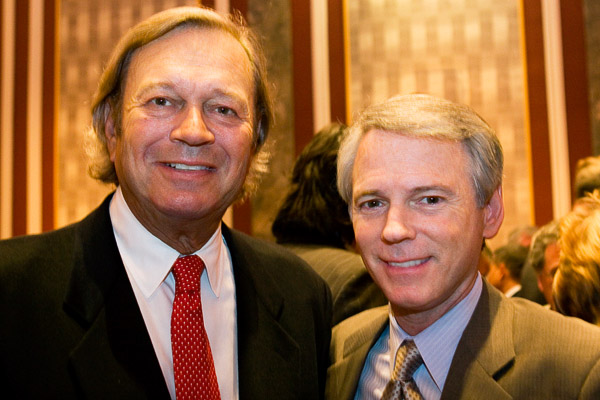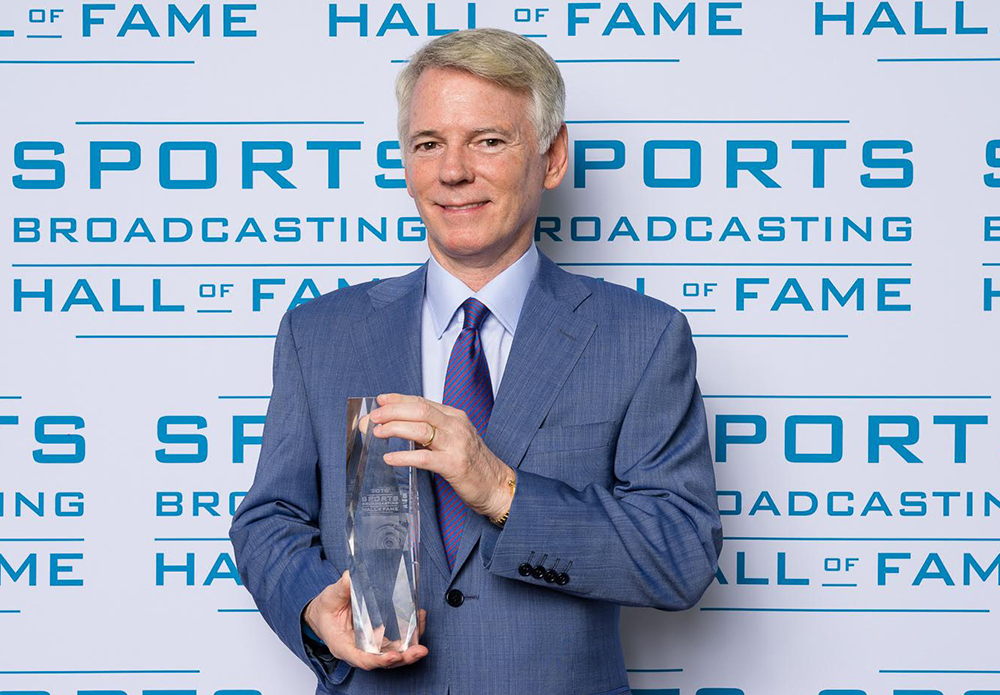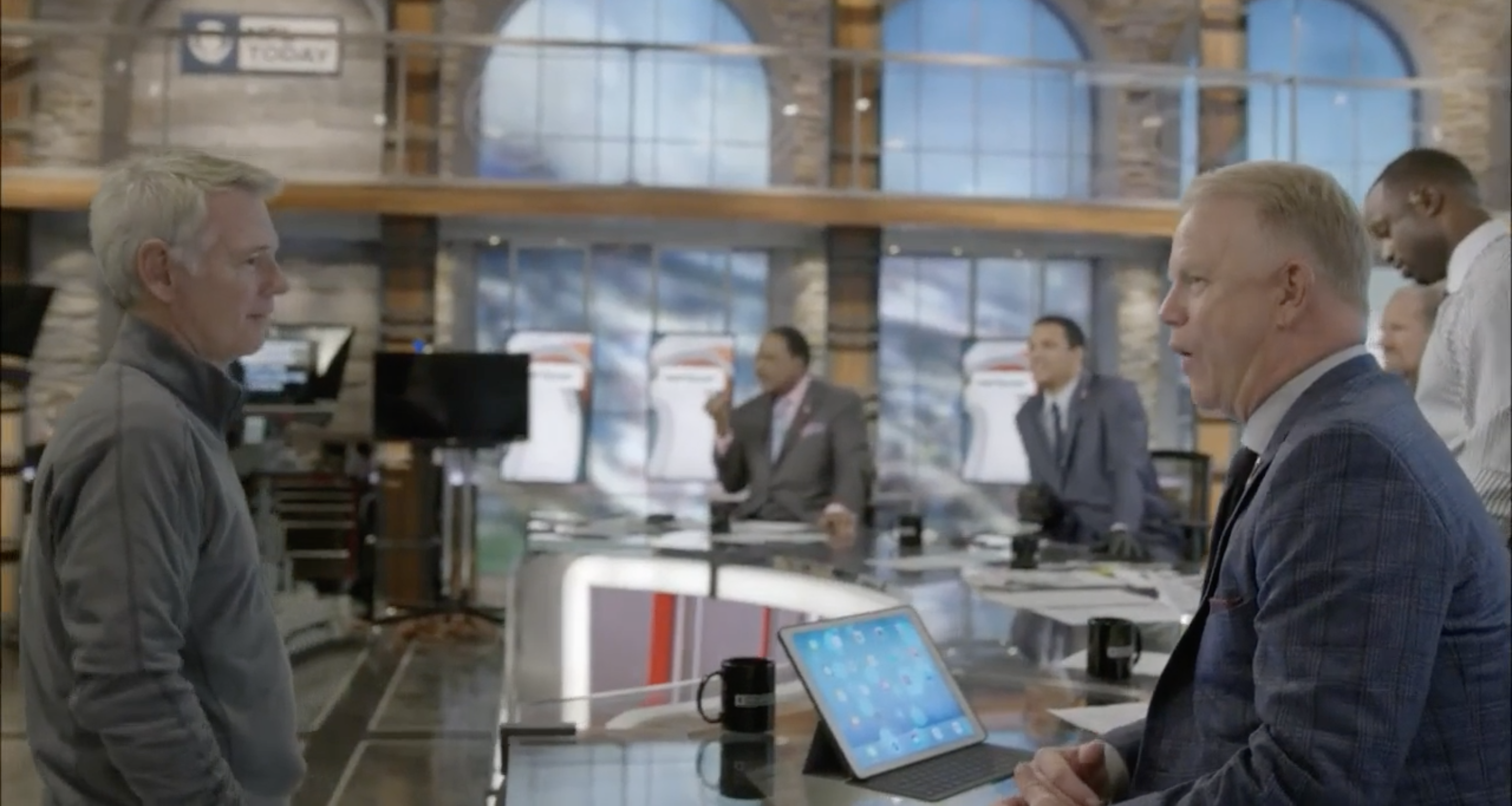Reflecting on a Storied Career: Sean McManus Looks Back While Keeping an Eye on the Future
The CBS Sports chairman retires after 28 years running the division
Story Highlights
The conclusion of this month’s Masters at Augusta National marked the end of one the most decorated careers in the history of sports broadcasting. CBS Sports Chairman and Sports Broadcasting Hall of Famer Sean McManus called it a career after nearly 28 years at the helm of the Tiffany Network’s sports division.
McManus was quite literally born into the industry. He began his journey into sports TV when he was a youngster, spending summers traveling with his father, legendary announcer and fellow Sports Broadcasting Hall of Famer Jim McKay, and experiencing not only the world’s greatest sports events but also those that made ABC’s Wide World of Sports such fascinating viewing week after week.
Known just as much for his character and impeccable integrity as for being a shrewd negotiator and bold leader, McManus also served as president of CBS News and held top front-office roles at Trans World International and NBC Sports. He began his career in 1977 at ABC Sports as a production assistant and associate producer.
The 20-time Emmy Award winner, who was named CBS Sports president in 1996 and to his current post in 2011, opted to go out on top, with the NCAA Men’s Final Four and The Masters crowning a stellar career. SVG sat down with McManus to reflect on his career, discuss how he feels about retiring, why he is confident he’s leaving CBS Sports in good hands with new chief David Berson, the role that technology and storytelling have played in his time at CBS, and where he sees the industry headed in the near future.
You certainly went out with a bang, with not only the Final Four and Masters but also CBS Sports’ earning four of the five Sports Emmy nominations for Outstanding Live Special. What does that type of recognition mean to you and the CBS Sports team?
It’s very satisfying, of course. When you work as hard as our people do in the industry and you get recognized, it’s a good feeling for the entire team. I’m very, very proud of our team, and I think, in many ways, they continue to set the standard for the entire industry. That’s going to continue for many, many years to come; I’m very confident of that.
What were you feeling at the Final Four and The Masters as you were closing out your career?
The Final Four was quite emotional for me. I’ve been doing the Final Four since 1997. I love the event, and I love being with our team. Hearing “One Shining Moment” for one final time in the stadium was very nostalgic for me.

McManus (right) with his mother, Margaret, and father, legendary broadcaster Jim McKay, who instilled in him core values and ethics that have served him well personally and professionally.
It was definitely an even more emotional weekend at Augusta National. I’ve done every Masters since 1997, when Tiger had his historic victory, so there is a lot of history there for me. I love the event, and I love Augusta National as much as anything I’ve been a part of in my entire career. A lot of memories came flooding back from the past 27-plus years.
Having said that, I feel very good about my decision. I’m ready to retire, and I think the division is ready for a new leader.
Speaking of that new leader, how confident are you in the state that you’re leaving CBS Sports in? And how do you think David Berson will continue the legacy that you helped to create?
I think the transition is going to be seamless. David has been literally in nearly every meeting, every negotiation, and every presentation that I’ve been a part of for more than a decade. He’s an amazing executive with vast knowledge in programming and production, negotiating, marketing, and communications. I don’t think we’re going to miss a beat with David taking over.
This has been our plan for more than 10 years, and we decided roughly two years ago that this would be my final event. I think the division is poised for even bigger and better things in the future, and I think David will do an absolutely terrific job — to a large extent because together we’ve built a phenomenal team in front of and behind the camera. I leave with a great feeling of pride and a great feeling of satisfaction for what we’ve accomplished.
When I look back on 30 years of watching CBS’s sports coverage over tens of thousands of hours, I’m struck by how CBS Sports has never been sensationalistic. You don’t see people yelling or ranting at each other. Was that by design? And is that a reflection of your approach toward sports broadcasting in general?
I think that is part of the tradition and legacy of CBS Sports, which goes back to the 1950s. We try to make sure that we’re not the story and that the announcers aren’t the story but that the story is the event we’re covering. Our play-by-play announcers and analysts try to play it pretty much down the middle so that the focus stays on the event. We certainly like having big personalities like a Tony Romo or Bill Raftery or now Trevor Immelman. None of them are shrinking violets, but, just as I do, they believe in storytelling at its best and letting the events and the athletes, not our announcers, be the stars.
Over your career, you definitely took some leaps of faith: moving from ABC to NBC to TWI to CBS Sports and then taking over CBS News. How did you approach those opportunities, and did you enjoy being stretched and taking on new challenges?
I always enjoyed a new challenge. The biggest stretch for me was when I was named vice president of programming at NBC at the age of 27. I hadn’t been in the programming business for all that long, and I found myself in meetings where I was the youngest and least experienced. I was challenged to get up to speed and to do the job that was given to me.

Fellow Sports Broadcasting Hall of Famer Don Ohlmeyer (left) was among McManus’s key mentors over the years.
But I was lucky to have great mentors throughout my entire career: from Roone Arledge and Chuck Howard at ABC to Don Ohlmeyer and Geoffrey Mason, two industry legends who hired me at NBC sports.
It was also definitely a stretch running CBS News at the same time I was running CBS Sports. I hadn’t worked in a news division since I was an intern at ABC News in the 1970s, when I was still in college. That was very challenging. While running CBS Sports at the same time, I was lucky that I had a really good team, with Tony Petitti at the helm. They allowed me all the time I needed to make sure that CBS News was in a position to succeed.
I’ve heard you say that you believe in running CBS Sports as a meritocracy, with innovation, change, and new ideas as the key drivers. Is your innate leadership style meritocracy? How was it shaped over the years by the mentors you mentioned?
Absolutely. We have the most extraordinary team at CBS Sports, and — although I think this is cliché — I truly do think it’s a family. We all have enormous respect for each other and genuinely enjoy each other’s company. There is a complete and total lack of politics or pride of authorship. We all root for each other and have a lot of fun together. Whether it’s the Final Four or The Masters or the Super Bowl or any of our other great events, we understand how lucky we are to have these jobs. We work extremely hard — as all people in the sports-television industry do. We work on weekends and holidays, but we love what we do.
If I look at what I’m going to miss the most, I will certainly miss all the great events that we get to produce. But what I’ll miss most is the team that we’ve developed over the last 27 years. I know that I will in some ways always feel a part of CBS Sports. I’ll be rooting my hardest for everyone in the division. And I’ll always have an incredible amount of affection in my heart for the men and women with whom I’ve worked for 2½ decades.
Obviously, technology has changed a lot since you entered the business in 1977. Are there any technologies or innovations that stick out to you or that you remember as a genuine ‘wow’ moment?
I think, with the advent of high definition, the coverage of sports television took a huge leap forward. We were able to upgrade the quality of what viewers were watching to the level of what you’re used to seeing in person, with the same incredible vibrant colors and clarity. That was certainly a huge step forward.
I also think the addition of super-slo-mo replays, which are now commonplace, was another big leap forward. The quality of audio in the last few decades has dramatically improved as well. Aerial coverage, including drones, is another big one. At a place like Augusta National, before the drones, you never had live aerial coverage of the golf course. We have that now, and it has dramatically enhanced our broadcasts. Aside from the move to HD, I would say those three advances have been the most significant changes in the way people consume sports.

McManus worked hard to establish quality relationships with major pro sports leagues, especially the NFL and fellow Hall of Famer Howard Katz.
Do you think the leagues are much more understanding and welcoming of these innovations than they were when you started out? How are they allowing broadcasters to present the game in new ways in terms of player mics, drones, and those types of tools?
Yes, I think the leagues and organizing bodies are completely on board at this point. They push us to be innovative. The team that runs Augusta National, just like the NFL, NCAA, PGA TOUR, PGA of America, and our other partners expect us to be innovative and are wholly supportive of our efforts. For example, when it comes to even a small addition like the Doink Cam in the goalpost [for Super Bowl LVIII], the support from the NFL was amazing. So, yes, I think all of this [technical innovation] is being done in conjunction with the leagues, and they not only are supportive but expect us to be innovative.
I assume you’re going to still be watching plenty of sports and observing the industry from the sidelines. What do you expect over the next couple of years in new opportunities for the industry? Is there anything on the horizon that you think is going to open up sports-media content creation in new ways?
I think the growth of women’s sports is going to be a major narrative going forward. It’s not just the phenomenon of Caitlyn Clark and women’s basketball but also the growth of women’s soccer. You’re going to see that trend continue, for sure.

McManus with his children Maggie and Jackson along with NFL Today anchor James Brown at the CBS Broadcast Center
I also think the traditional sports that have done so well on broadcast television will continue to dominate, especially football. Those sports will become increasingly more important in this very complex media world in which we’re all living.
I think the future is bright for sports television generally and CBS Sports specifically. I will still be watching an enormous amount of sports since I grew up in the industry and love sports, as all of us do who are in this business. I’ll be a very interested viewer and will try to resist the temptation to call the control room and offer my suggestions.
Jason Dachman contributed to this article. This interview has been edited for length and clarity.
All images courtesy of the Sports Broadcasting Hall of Fame. CLICK HERE for more McManus’ legendary career and full Sports Broadcasting Hall of Fame induction video.





